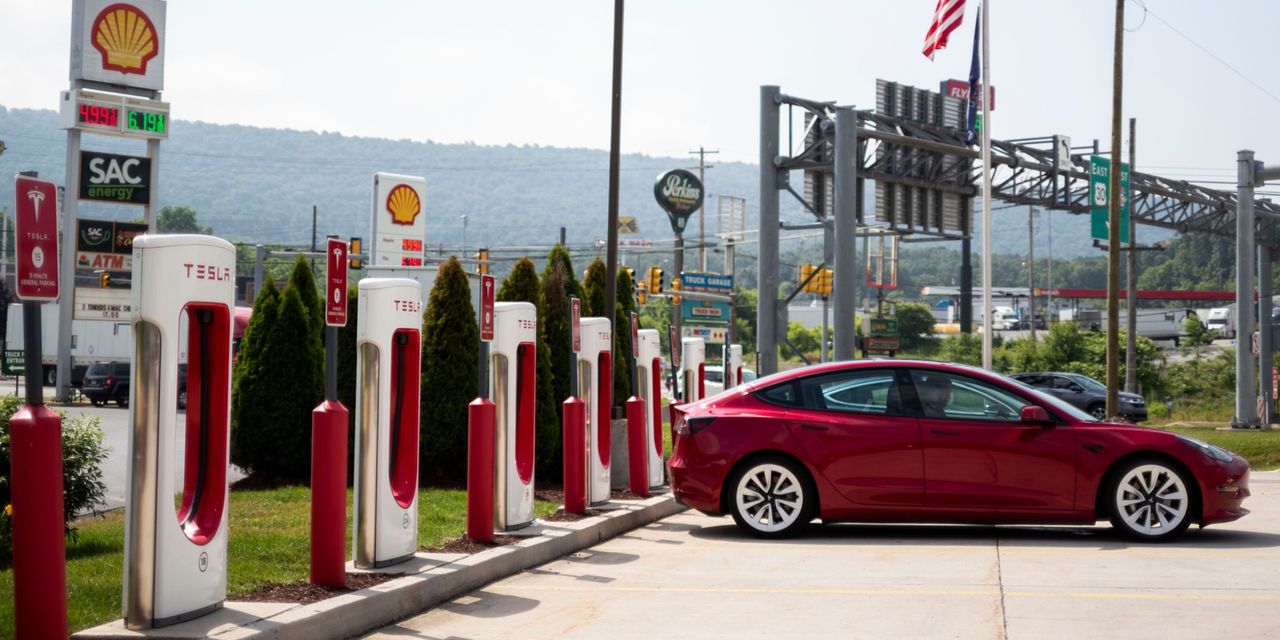For investors interested in
Tesla
and companies with the highest environmental, social and governance, or ESG, standards, there is some good news and some bad news.
The good news is Tesla was added to the
S&P 500
ESG Index in April. It means investment managers tracking the benchmark can buy Tesla stock. It’s also an acknowledgment that Tesla is running its business in line ESG principles.
The bad news: Based on
S&P Global
(SPGI) ESG scores updated in May, Tesla still scores way below average, lower than most auto makers and lower than
Chevron,
which was also added to the index.
Tesla scored 37 out of a possible 100. Chevron scored 43. S&P Global didn’t immediately respond to a request for comment about scores.
Tesla’s goal is to put the world on a path to a sustainable energy future. According to Tesla, that partly requires renewable power generation, battery storage technology, and electrified personal transportation. Tesla does all three of those things which is why it might surprise investors to learn a company with that mission scores just half of the average S&P Global ESG score of 72.
But E is one letter in ESG. Tesla does fairly well on that metric, scoring 60. That’s better than Chevron’s environmental score of 48. Still, Tesla’s E score lags behind the best auto maker, Volvo. It scores 85 on the environmental portion of the S&P ESG rating.
Volvo sold about 163,000 cars in the first quarter. About 29,000 were fully electric. Tesla is the world’s largest seller of all-electric vehicles. It sold 422,875 EVs in the quarter.
As for Chevron, social and governance scores is where the oil producer caught the EV maker. Chevron scored 42 and 40 on those two metrics, respectively. Tesla scored 20 and 34, respectively.
Disclosure practices might be part of Tesla’s problem. Tesla discloses less information than other companies, according to S&P Global. Scores are, at least partly, built using 61 industry specific questionnaires. “For companies that do not respond, a team of expert analysts fill the assessment questionnaires on their behalf using publicly available information,” reads part of S&P Global’s scoring methodology document.
S&P Global puts Tesla’s disclosure practices in the Medium category. It puts disclosure practices from cigarette maker
Philip Morris International
(PMI) in the Very High category. That might be one reason Philip Morris’ total ESG score is 84 and its E score is 87.
Tesla didn’t respond to a request for comment about its inclusion in the S&P 500 ESG Index or its ESG score. And CEO Elon Musk didn’t respond to a request for comment about recent scores.
In the past, he hasn’t held back when sharing his ESG thoughts. It’s “a scam,” Musk tweeted in May 2022. “It has been weaponized by phony social justice warriors.”
Tesla does produce an annual impact report that reviews environmental, product, and personnel matters. The 2022 report said the total cost of owning and operating a Model 3 is about the same as a
Toyota Motor
(TM) Corolla. Tesla has made EVs affordable. (Toyota’s ESG score is 45, topping Tesla.)
What’s more, 67% of Tesla employees are from underrepresented groups and the company added about 29,000 workers in 2022, bring its global employee count to almost 128,000.
The impact report might have some of the information needed for investors to debate whether or not Tesla deserves a higher total ESG score. At least investors don’t have to debate whither or not Tesla should be in the S&P 500 ESG Index. The company has made it that far.
Corrections & amplifications: S&P Global gave Tesla a governance score of 34. A previous version of this article incorrectly said Tesla’s governance score was 25.
Write to Al Root at [email protected]
Read the full article here




